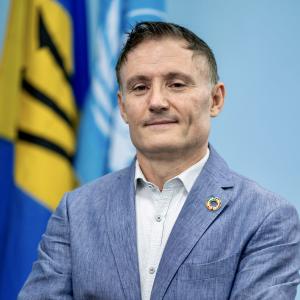- Distinguished speakers and participants from the OECS Commission,
- Representatives and participants of OECS Member States,
- Distinguished members of the diplomatic corps, and our development partners,
- UN agency partners, particularly those involved in the organization of this Seminar: UNEP, UNDP and FAO,
- Participants from the regional private, banking and investment sectors,
- Other distinguished guests and participants,
Ladies and gentlemen!
Good morning and welcome to Day 2 of the Seminar - “Financing the Sustainable Blue Economy in the OECS”. Today’s session focuses on the theme: “The Sustainable Blue Economy and Private Investment Opportunities”.
Bottom line up front, we in the UN System urge all the private sector to join the mission of maximizing development in the OECS blue economy, and to #UniteBusiness for our shared sustainable futures.
From the outset, what comes to mind is the role and involvement of the private sector in the development and strength of such an important unifier of the OECS countries - the blue economy, all against the backdrop of the recently concluded COP27 climate convention in Egypt, and the upcoming Biodiversity COP15, in December. Business, the Blue Economy, and Sustainability are more related than different.
With the new loss and damage fund which will benefit the countries most vulnerable to the effects of climate change being praised as COP27’s major outcome, we have to bear in mind this victory for supporting the sustainable development in the Eastern Caribbean by taking advantage of blue economy resources.
For this, we have to acknowledge the leadership, work and advocacy of Governments within this region; namely:
- The Government of Antigua & Barbuda – as chair of the Alliance of Small Island Developing States (AOSIS) whose relentless work was rewarded with the COP27 agreement on the loss and damage fund.
- Her Excellency, Prime Minister Mia Amor Mottley’s advocacy and her administration’s work in negotiating concessional debt financing terms from international donors, and in building a coalition of governments to work towards reforming the international financial system.
Both efforts have changed the international climate financing landscape by making more visible the urgency, vulnerability and financing needs of SIDS and developing states, to achieve the 2030 Sustainable Development Agenda.
The Need and Drive for Global Compact
Ladies and gentlemen, the UN Resident Coordinator’s Office for Barbados and the Eastern Caribbean is hard at work on establishing a UN Global Compact network for the Caribbean. The Global Compact is the world’s largest corporate sustainability initiative – with 69 Local Networks made up of more than 15,000 companies and 3,000 non-business participants, based in over 160 countries. These networks have the goal of #UnitingBusiness for a better world and building accountability in companies to the #TenPrinciples on human rights, labour, environment and anti-corruption.
The Polycrisis
Right now, humanity faces the shared – “polycrisis” –or “triple global crises”, consisting of:
-
- A “food, fuel and finance” crisis, worsened by the COVID-19 pandemic, the Ukraine war and global economies’ highest levels of inflation ever recorded,
- A “cost of living, developing country, debt and climate” crisis which describes the situation in OECS countries - one that’s complex and difficult to solve by any one major player, and therefore in urgent need of collective action: and
- The “climate, pollution and biodiversity (or triple planetary)” crisis – driven by decades of unsustainable consumption and production, uncontrolled pollution and excessive waste. Our natural ecosystems have become weaker and are more unable to protect against recurring storms and hurricanes, and to support our food supply.
Sustainable Blue Economy, The Private Sector and National Development
Against that background, as OECS countries, our collective action must show as much tenacity as our advocacy for support and financing.
With the ocean being the planet's largest ecosystem, playing such a critical role in our shared existence, sustainable development in the OECS and achievement of the SDGs needs integrated approaches, innovation, financing and risk taking from the private sector. After #COP27, the expectations are set for stakeholders to turn their commitments into action.
Therefore, the private sector remains key to sustainable development, regardless of business size, along with the banking community and investors. In our collective role in building a better planet, domestic and international banks serve to accelerate a positive global transition for people and the Partnership with civil society organizations who bring real skills to problem-solving are key to this drive towards a more sustainable blue economy.
What exists within the Sustainable Blue Economy for the OECS?
Traditional livelihoods in the OECS like fisheries, deep-sea fishing, sports, tourism, shipping, and yachting remain essential to the region’s continued peaceful existence and cooperation across boundaries.
For the region, a sustainable blue economy creates more space for better management, innovation, the transition to using renewable energy, more widespread use of technology, inclusion, and a rise in income for vulnerable populations of women, youth and persons with disabilities who are often excluded from development opportunities.
While our common ‘blue’ space in the OECS presents business opportunities; we still need sound and feasible projects that will attract investment, foster innovation and sustainable development in the long term.
And in that regard, I wish to echo the continued support of the UN system in Barbados and the Eastern Caribbean, through our multi-country cooperation framework with Governments, with shared target of achieving the SDGs within the next decade. Therefore, we urge the private sector to #UniteBusiness in the region through UN Global Compact, and to join the mission of maximizing development in the OECS blue economy.
Ladies and gentlemen, colleagues – thank you – and I wish you the best of success in today’s proceedings.












